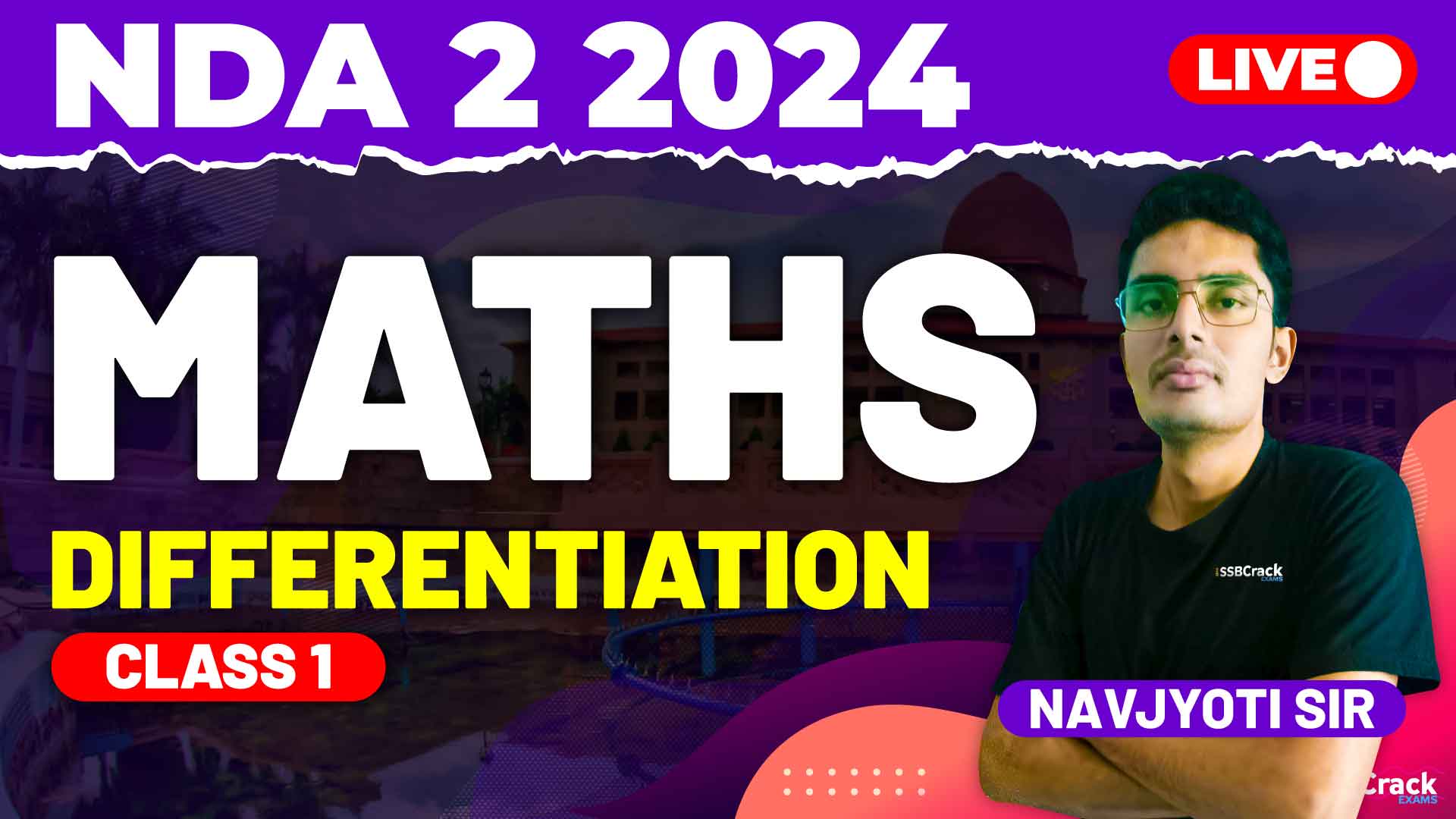Preparing for the NDA-NA Exam requires a solid grasp of various mathematical concepts, one of the most critical being differentiation. Differentiation is a fundamental topic in calculus, and understanding it thoroughly can significantly boost your performance in the Mathematics section of the exam. This article will highlight the key sub-topics covered in our preparation class, including the derivative of a function, differentiability, derivatives of standard functions, implicit functions, derivative by substitution, logarithmic differentiation, successive differentiation, second derivative, and other related topics. We will also explore strategies for effectively approaching this topic and solving multiple-choice questions (MCQs) on differentiation.
Understanding Differentiation
Derivative of a Function
The derivative of a function measures the rate at which the function’s value changes as its input changes. It’s a fundamental concept that provides insights into the behavior of functions, including their slopes and rates of change. Mastering the concept of derivatives involves understanding how to compute them and interpret their meanings.
Differentiability
A function is said to be differentiable at a point if it has a derivative at that point. Differentiability implies continuity, but not all continuous functions are differentiable. Understanding differentiability helps in identifying where a function has a defined slope and where it does not.
Key Sub-Topics
Derivative of Standard Functions
Learning the derivatives of standard functions such as polynomials, trigonometric functions, exponential functions, and logarithmic functions is crucial. These standard derivatives form the basis for more complex differentiation problems and are often tested in exams.
Implicit Functions
Implicit differentiation is used when a function is not given explicitly but rather implicitly. This technique is essential for finding derivatives of equations where the dependent and independent variables are mixed together.
Derivative by Substitution
This method involves substituting a part of the function with a new variable to simplify the differentiation process. It’s particularly useful for complex functions and helps in breaking down complicated expressions into simpler ones.
Logarithmic Differentiation
Logarithmic differentiation is a technique used to differentiate functions by taking the natural logarithm of both sides of an equation. It’s especially helpful for functions involving products, quotients, or powers, making the differentiation process more manageable.
Successive Differentiation and Second Derivative
Successive differentiation involves finding higher-order derivatives of a function. The second derivative, for example, provides information about the concavity of the function and the nature of its critical points. Understanding how to compute and interpret higher-order derivatives is crucial for a thorough understanding of the behavior of functions.
Solving MCQs on Differentiation
Our class placed significant emphasis on solving MCQs related to differentiation. Here are some strategies to approach these questions effectively:
1. Understand the Question
Carefully read the question to understand what is being asked. Identify whether you need to find the first derivative, a higher-order derivative, or if the question involves a specific technique like implicit differentiation or logarithmic differentiation.
2. Choose the Right Technique
Based on the function given and the requirements of the question, select the appropriate differentiation technique. For standard functions, apply basic differentiation rules. For more complex functions, consider using substitution or logarithmic differentiation.
3. Simplify the Function
If the function is complex, simplify it as much as possible before differentiating. This might involve algebraic manipulation, factoring, or other techniques to make the differentiation process easier.
4. Practice Common Patterns
Many differentiation problems follow common patterns or involve standard functions. Practicing these types of problems can help you recognize and solve them quickly during the exam.
5. Check Your Work
After finding the derivative, review your steps to ensure there are no mistakes. Double-check your calculations and ensure that you have applied the differentiation rules correctly.
Effective Preparation Strategies
1. Build a Strong Foundation
Start with a solid understanding of the basic concepts of differentiation. Ensure you are comfortable with the rules of differentiation and can apply them to various types of functions. Use visual aids, such as graphs, to help conceptualize the behavior of functions and their derivatives.
2. Consistent Practice
Regular practice is essential for mastering differentiation. Work on a variety of problems to become familiar with different types of questions. This practice not only helps reinforce your understanding but also improves your speed and accuracy.
3. Utilize Study Resources
Make use of textbooks, online tutorials, and educational videos to deepen your understanding of differentiation. These resources often provide additional examples, explanations, and problem-solving techniques that can be very helpful.
4. Solve Previous Year Papers
Reviewing previous year question papers is an excellent way to understand the exam pattern and the types of questions that are commonly asked. This practice will help you manage your time effectively during the actual exam and identify important topics.
5. Engage in Group Study
Group study sessions and discussions with peers can provide new insights and help clarify doubts. Explaining concepts to others is also a great way to reinforce your own understanding.
6. Seek Help When Needed
If you encounter difficulties, don’t hesitate to seek help from teachers or tutors. Clarifying doubts promptly will prevent confusion and ensure a solid understanding of the material.
7. Time Management
Effective time management is crucial during the exam. Practice solving questions within a set time limit to simulate exam conditions. This will help you become more efficient and reduce exam-day stress.
Conclusion
Mastering differentiation is essential for excelling in the Mathematics section of the NDA-NA Exam. Our class focused on understanding the key concepts and practicing essential MCQs to ensure thorough preparation. By understanding the core sub-topics and employing effective preparation strategies, you can excel in this topic.
In conclusion, dedicating time to understand and practice these concepts, especially focusing on solving MCQs, will significantly enhance your performance in the NDA-NA Exam. Remember to maintain a consistent study routine, utilize visual aids, and engage in group discussions to solidify your understanding. With these strategies in place, you will be well on your way to mastering this crucial topic and achieving success in your exam preparation.







